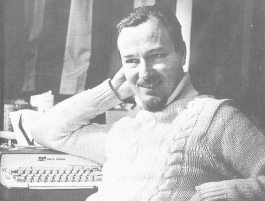A Quote by Francois de La Rochefoucauld
Things often offer themselves to our mind in a more finished form in the very first thought, than we might have made them by muchart and study.
Related Quotes
Now, may our God be our hope. He Who made all things is better than all things. He Who made all beautiful things is more beautiful than all of them. He Who made all mighty things is more mighty than all of them. He Who made all great things is greater than all of them. Learn to love the Creator in His creature, and the maker in what He has made.
We've been slaves to our tools since the first caveman made the first knife to help him get his supper. After that there was no going back, and we built till our machines were ten million times more powerful than ourselves.
We gave ourselves cars when we might have learned to run; we made airplanes when we might have grown wings; and then the inevitable. We made a machine our God.
There is will in the thought, there is none in the dream. The dream, which is completely spontaneous, takes and keeps, even in the gigantic and the ideal, the form of our mind. Nothing springs more directly and more sincerely from the very bottom of our souls than our unreflected and indefinite aspirations towards the splendours of destiny.
Cliche refers to words, commonplace to ideas. Cliche describes the form or the letter, commonplace the substance or spirit. To confuse them is to confuse the thought with the expression of the thought. The cliche is immediately perceivable; the commonplace very often escapes notice if decked out in original dress. There are few examples, in any literature, of new ideas expressed in original form. The most critical mind must often be content with one or the other of these pleasures, only too happy when it is not deprived of both at once, which is not too rarely the case.
You might have more talent than me, you might be smarter than me, you might be sexier than me, you might be all of those things you got it on me in nine categories. But if we get on the treadmill together, there are two things: You're getting off first, or I'm going to die. It's really that simple, right?
We are so vain as to set the highest value upon those things to which nature has assigned the lowest place. What can be more coarse and rude in the mind than the precious metals, or more slavish and dirty than the people that dig and work them? And yet they defile our minds more than our bodies, and make the possessor fouler than the artificer of them. Rich men, in fine, are only the greater slaves.
Our minds are forced to become fixed upon different things by an attraction in them which we cannot resist. To control the mind, to place it just where we want it, requires special training. It cannot be done in any other way. In the study of religion the control of the mind is absolutely necessary. We have to turn the mind back upon itself in this study.
Our surroundings are not contained by name and form. You are neither the body nor the mind, these are limits you identify with through a lack of clear-sightedness. When you are attentive to a tree or flower, the perception, shape, name and concept are not the only things present. There is also the All-presence that you share with them and that you are both part of. The very name and form spring forth from this eternal background, the All-presence. This is instantaneous awareness that cannot be reached by thought.
One might suppose that reality must be held to at all costs. However, though that may be the moral thing to do, it is not necessarily the most useful thing to do. The Greeks themselves chose the ideal over the real in their geometry and demonstrated very well that far more could be achieved by consideration of abstract line and form than by a study of the real lines and forms of the world; the greater understanding achieved through abstraction could be applied most usefully to the very reality that was ignored in the process of gaining knowledge.




































